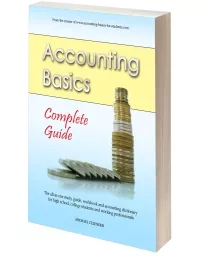Accrued Income Example Part 2:
Collecting From a Debtor
(Accounts Receivable)
Previous lesson: What is Accrued Income? (Part 1)
Next lesson: Expenses: Definition and Examples
In our previous accrued income example, the Smiths owed George's Catering (our sample business) $5,000 for catering services provided for a funeral, and were going to pay this at the end of April.
In this lesson we're going to see what happens to our accounting equation, and which accounts are affected, when we collect from this debtor (also known as accounts receivable).
Be sure to check your understanding of this lesson by taking the quiz in the Test Yourself! section further below. And right at the bottom of the page, you can find more questions on the topic submitted by fellow students.
g) The Smiths pay the full amount owed to George’s Catering on the 30th of April. Now what do we do on this date?
Well, the easiest part of this transaction is that we receive cash ($5,000). So cash or bank (asset) goes up.
But what happens with our debtor?
Our debtor (the Smiths) exists currently in our records at $5,000. If the Smiths are now paying us, does this mean that they owe us less, or more, or that there is no change?
Answer: They owe us less. In fact, they don’t owe us anything now.
So we increase our cash by $5,000, and we decrease our debtors (the value of debts owed to us) by the same figure to zero:
George’s Catering still consists of assets of $35,000 (just like before), but this is now made up of baking equipment to the value of $12,000, $23,000 cash and $0 debtors.
Our debtors amounts to $0 – this makes sense as we are showing that the debt towards George’s Catering no longer exists.
Want to see the journal entry for this transaction?
The Accrual Basis of Accounting:
Difference Between Income and Cash
As you can clearly see here, income is definitely not the same as cash.
Income is the event itself - in this case the act of George's Catering providing catering services on the 8th of April. Income is the event that takes place that results (either immediately or later on) in more assets for your business.
The cash is a separate element of accounting and was received later - on the 30th of April.
The income did (eventually) result in more cash for the business – as it always should.
Test Yourself!
Before you start, I would recommend to time yourself to make sure that you not only get the questions right but are completing them at the right speed.
Difficulty Rating:
Beginner
Quiz length:
2 questions
Time limit:
3 minutes
Important: The solution sheet on the following page only shows the solutions and not whether you got each of the questions right or wrong. So before you start, get yourself a piece of paper and a pen to write down your answers. Once you're done with the quiz and writing down your answers, click the Check Your Answers button at the bottom and you'll be taken to our page of solutions.
Good luck!
IMPORTANT: Do not move forward if you're confused. Instead, take a step back to the previous lesson with the first accrued income example, or further back to the simpler example of a cash income transaction in the lesson entitled Define Income.
Go over these lessons again. If you're still having trouble, return to earlier sections you didn't feel so cool about, even things early on in the section on Basic Accounting Concepts. See if you can spot anything you didn't quite get the first time regarding the elements of the basic accounting equation. Then return to this lesson and review it once again.
When you're comfortable with the concepts we just went over, feel free to move on.
Return to Basic Accounting Transactions
Return to the Home Page
Stay up to date with ABfS!
Follow us on Facebook:
Previous lesson: What is Accrued Income? (Part 1)
Next lesson: Expenses: Definition and Examples
© Copyright 2009-2023 Michael Celender. All Rights Reserved.
Click here for Privacy Policy.









Comments
Have your say about what you just read! Leave me a comment in the box below.